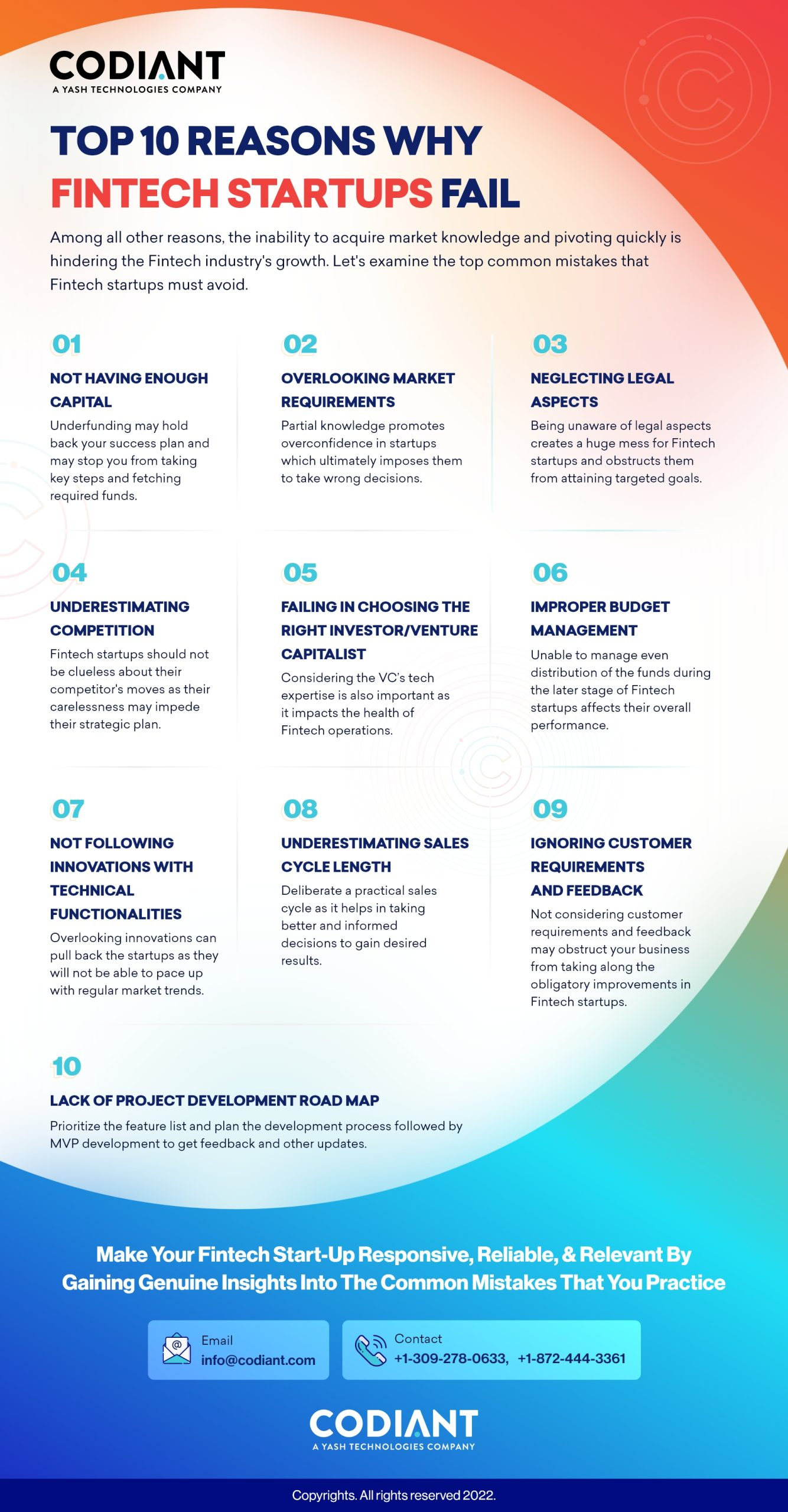Top 10 Common Mistakes That Lead To FinTech Startups Failure
1. Not Having Enough Capital
For any business to make its successful entry, money and time are the two crucial factors that determine its effectiveness and sustainability. Usually, FinTech app development requires a heavy budget, which includes category-specific tools, top-talented developers, and other vital resources. So, having funds flowing continuously is significant for fintech startups to gear up.
To make all this possible, the app company has to be gripped by a huge budget or be backed up by investors or venture capital. This helps FinTech startups to raise timely investment for the project and save themselves from shuttering.
2. Overlooking Market Requirements
The basic aim each app follows is to come up with a feasible solution for a problem that the user faces. However, if the entrepreneur fails to analyze the right problem and accurate solution for the same, then, no money or tech experts, or any fintech app development company can save the startup from shutting down.
Hence, before finalizing any problem and solution for that; it is necessary to carry out detailed market research to analyze the feasibility and intensity of the problem a user faces in the fintech industry.
Eventually, customer experience is the basic building block of any holistic app development. Thus overlooking market requirements and just chasing capital gains will ultimately obscure real damage.
3. Overlooking Legal Aspects
When funds and finances along with crucial and personal details are involved, then taking care of all the legal and security measures becomes mandatory for any business. Therefore, a fintech company must comply with all the financial laws and legal aspects along with genuine license certification to operate smoothly and gain customer trust as well.
Many fintech entrepreneurs fail to research varied legal aspects of the industry, which raises the risk of product failure. However, going with a solid and well-planned legal strategy and the right documentation can prevent a startup from facing failure.
4. Underestimating Competition
Automation in businesses has widespread reach therefore, before entering the crowded market, it is a must to first analyze the competitors and the services/solutions they are offering.
You can’t turn a blind eye and assume that being a newbie with cutting-edge propositions in the industry you are going to be successful and nobody can surpass you.
There is intense competition in the market, and so are the chances of business failure. Before you catapult your business concept, get into the depths of competitor research and analyze all the required details.
Check out who is in the market space, what and how they are doing, and ensure to come up with something valuable and unique to offer to your customers after monitoring its risk. If you failed to do so then you may get into trouble.
5. Failed to choose the Right Investor or Venture Capitalist
Funds are vital for any business’s survival but finding the right and highly skilled investor is very important. Contrary to popular belief, the Venture Capitalist you are associating with should not only be the source for offering their money. Some VCs are even lifelong financial advisors and technical business experts. Many of them have previous finance industry experience.
That said, you may always count on them to offer their brand name to increase the popularity of your business and acquire market expertise like infrastructure, technology centric operations, human resource planning, performance evaluation, etc. to improve the efficacy of your budding company with a high uptick.
Failing to associate with the right experts or financial partners, could cause trouble for your business and may lead to early business failure. Therefore, before tying knots with the venture capitalist, ensure they have sufficient industry expertise, the type of reporting they expect from you, and the governance you require from them.

6. Improper Budget Management
Shortage of finances often leads to the failure of a business, hence a business must abide by proper budget management and refrain from making wrong and untimely investments.
For instance, a new Fintech company initially doesn’t need to have top-quality and expensive software for its system. Apart from that, being a new entrant in the business, it is not mandatory to furnish and automate your workplace with new and latest gadgets.
All these updates can be done in multiple phases, as the business progresses and opens its wings in the market. Hence, it is necessary to focus on customer satisfaction and quality services instead of providing all the luxuries to employees in one go. So, plan your budget intelligently and make the right investments to save your Fintech startup from facing the failure phase.
Read More: Top Fintech Trends to Follow In 2023
7. Not Following Innovations with Technical Functionalities
Low-tech product weapons may die an embarrassing death. Integrating new technologies in your Fintech app product may save your startups from falling into the graveyard.
Cutting-edge products backed with modern and innovative technologies enhance their working functionalities, which ultimately improves user experience and raises its market demand as well.
Technologies like Artificial Intelligence and Machine Learning help to forecast and make accurate financial decisions rather than having guesswork. Such automation reduces trivial investments and promotes intelligent investment decisions.
For example, with smarter chatbots, the staffing cost can be trimmed down to a great extent. Chatbots are equipped with AI technology that constructs a conversational experience, identifies fraudulent activities, and are responsive to the conducive environment. Hence, implanting innovations can make your startup less nightmarish.
8. Underestimating Sales Cycle Length
Often, every business considers itself a well-organized and planned business making into the market, and Fintech startups are no exceptions. Eventually, the startups consider their product or services as the best and consider them worthy to beat all the sales deadlines.
But little do they know, customers who are already swayed on the existing market products and services cannot be instantly lured to a new market entrant, only unless it provides a compelling value proposition.
That said, when the ball is in the customer’s court, the FinTech companies are required to maintain patience and tenacity. And craft strategies that gradually attracts customers with their progressive services.
Additionally, always be in the real world by defining a longer sales cycle for your startup business plan, rather than expecting everything to happen instantly.
Keeping such unrealistic expectations may make you reckless and push you to make untimely decisions, which ultimately leads to fintech startup failure.
9. Ignoring Customer Requirements & Feedback
No business can survive in the market, which fails to deal with customers’ requirements and does not take action on their feedback. As a matter of fact, a product that doesn’t deal with the pain points of the customers is destined to die soon.
The Fintech business and services should follow the customer-centric approach. It should provide in-depth insights to take action on implementing any changes.
If a Fintech startup fails to fulfill customer expectations and requirements, then sooner or later the failure comes knocking at your doorstep. Hence, to avoid such a scenario with your business, consider acquiring customer feedback and act accordingly. This will help you reduce inefficiency and incapability of the product, and provide valuable and accurate solutions to customers’ problems.
10. Lack of Project Development Road Map
Introduced a top-quality unique product but having a tough time gaining buyers? This situation can be faced by any business as customers are unpredictable which apparently leads to business failure.
Well, such situations can be avoided by creating an organized roadmap to develop the project in multiple phases. Each phase has features based on its priority i.e. higher priority in first phase development, lesser priority in the second phase, and so on.
However, making a basic version of a properly working project i.e. MVP development with enough features is preferred to validate the project idea and gain customers’ attention and feedback. Such development planning helps businesses to understand the project’s effectiveness in the market, then follow the next development phase or introduce changes, if required. This will support a business to sustain longer while saving themselves from standing on the verge of failure.
Conclusion
Success and failure are the two sides of the same coin, where a startup either succeeds or fails while investing in the Fintech industry.
All the above-mentioned points can be seen as virtues that can still save you from falling into the cracks. However, it doesn’t give the surety that the product will be a success shortly. It requires a hell lot of effort and precautions to build a successful business.
In reference to this, Fintech project development is one of the crucial aspects. And in the process of building the tech infrastructure, it requires an expert FinTech Web and App Development Company.
In order to influence, Fintech app developers at Codiant can extensively be your greatest strength. Our host of teams -from project managers to UX designers and strategists to developers- is arguably the iconic arm of any startup looking to head into the crowded market and battle on the front.





